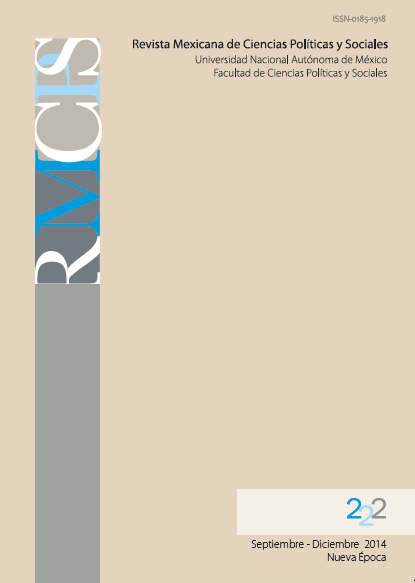Neoliberal Elites in Mexico: How a Field of Power that Transforms Social Practices of Political Elites is Built
Main Article Content
Abstract
Downloads
Article Details
Citas en Dimensions Service
References
Aguilar Monteverde, Alonso, (1974) Dialéctica de la economía mexicana. México, Nuestro Tiempo.
Babb, Sarah, (2012) “The Washington Consensus as Transnational Policy Paradigm: Its Origins, Trajectory and Likely Successor” en Review of International Political Economy. Vol. 20, núm. 2, pp.: 268–297.
Babb, Sarah, (2001) Managing Mexico. Economists from Nationalism to Neoliberalism. Princeton, Princeton Univ. Press.
Bourdieu, Pierre, (2005) The Social Structures of the Economy. Cambridge, Polity Press.
Camp, Roderic A., (2012) Metamorfosis del liderazgo en el México democrático. México, Fondo de Cultura Económica.
Camp, Roderic A., (1995) Los mexicanos y la política en México: Una visión contemporánea. México. Fondo de Cultura Económica.
Camp, Roderic A., (1989) Entrepreneurs and Politics in Twentieth Century Mexico. Oxford, Oxford Univ. Press.
Camp, Roderic A., (1985) “The Political Technocrat in Mexico and the Survival of the Political System” en Latin American Research Review. Vol. 20, núm. 1. pp.: 97-118.
Camp, Roderic A., (1980) Mexico’s Leaders: Their Education and Recruitment. Tucson, Univ. of Arizona Press.
Campbell, John L., (2002) “Ideas, Politics, and Public Policy” en Annual Review of Sociology. Vol. 28, pp.: 21-38.
Carrillo Castro, Alejandro, (2010) 200 Años de Administración Pública de México. Tomos I, II y III. México, INAP.
Centeno, Miguel, (1999) Democracy within Reason. Technocratic Revolution in Mexico. PA, Penn, State Press.
Cerutti, Mario y Carlos Marichal (eds.), (1997) Historia de la grandes empresas en México, 1850-1930. México, FCE- UANL.
Dos Santos, Theotonio, (2002) La teoría de la dependencia. Balance y perspectivas. México, Plaza y Janés.
Fourcade, Marion, (2006) “The Construction of a Global Profession: The Transnationalization of Economics” en American Journal of Sociology. Vol. 112, núm. 1, pp.: 145-94.
Fourcade, Marion y Sarah L. Babb, (2002) “The Rebirth of the Liberal Creed: Paths to Neoliberalism in Four Countries” en American Journal of Sociology. Vol. 108, núm. 3, pp.: 533-79.
Frank, André Gunder, (1967) Capitalism and Underdevelopment in Latin America. Nueva York, Monthly Review Press.
Jessop, Bob, (2004) “Hollowing out the ‘Nation-State’ and Multilevel Governance” en Kennett, Patricia, (ed.), A Handbook of Comparative Social Policy. Mass., Edward Elgar Publishing, pp.: 11-24.
Knight, Alan, (1992) "Mexico's Elite Settlement: Conjuncture and Consequences" en Gunther, Richard, y John Higley (eds.), Elites and Democratic Consolidation in Latin America and Southern Europe. Cambridge, UK, Cambridge University Press, pp.: 113-145.
Langston Hawkes, Joy, (1995) The Camarillas in the Mexican Polical System. Tesis de doctorado en Ciencia Política por la Universidad de Duke.
Maxfield, Sylvia, (1990) Governing Capital. International Finance and Mexican Politics. Londres, Cornell Univ. Press.
Rosenau, James, (1988) “Patterned Chaos in Global Life: Structure and Process in the Two Worlds of World Politics” en International Political Science Review. Vol. 9, núm. 4, pp.: 357-394.
Rostow, Walt Whitman, (1960) The Stages of Economic Growth: A Non-Communist Manifesto. Londres, Cambridge Univ. Press.
Sassen, Saskia, (2010) [2006] Territorio, autoridad y derechos. De los ensamblajes medievales a los ensamblajes globales. Buenos Aires, Katz Editores.
Savage, Mike y Karel Williams, (2008) “Elites: Remembered in Capitalism and Forgotten by Social Sciences” en Sociological Review. Vol. 56-S1, pp.: 1-24.
Scott, John, (2008) “Modes of Power and the Reconceptualization of Elites” en Sociological Review. Vol. 56-S1, pp.: 25-43.
Silva, Eduardo, (1996) The State and Capital in Chile. Business Elites, Technocrats and Market Economics. Boulder, Colorado, Westview.
Slaughter, Anne-Marie, (2004) “Disaggregated sovereignty: Towards the public accountability of Global government networks” en Government and Opposition. Vol. 39, núm. 2, pp.: 159-190.
Stone, Diane, (2008) “Global Public Policy, Tansnational Policy Communities, and their Networks” en The Policy Studies Journal. Vol 35, núm. 1, pp.: 19-38.
Wallerstein, Immanuel, (1979) The Capitalist World Economy. Cambridge, Cambridge Univ. Press.
Wasserman, Mark, (1987) Capitalistas, caciques y revolución: la familia Terrazas en Chihuahua, 1954-1911. México, Grijalbo.

La Revista Mexicana de Ciencias Políticas y Sociales publicada por la Universidad Nacional Autónoma de México se distribuye bajo una Licencia Creative Commons Atribución-NoComercial-SinDerivar 4.0 Internacional.
Basada en una obra en http://www.revistas.unam.mx/index.php/rmcpys/
La RMCPyS autoriza a sus colaboradores que suban una copia de sus trabajos publicados en sus webs personales o en cualquier repositorio de acceso abierto, siempre y cuando se mencione específicamente a la Revista Mexicana de Ciencias Políticas y Sociales como fuente original de procedencia, citando el año y número del ejemplar respectivo y añadiendo el enlace a la página web donde este órgano editorial puede ser consultado in toto, de manera abierta y gratuita en: <www.revistas.unam.mx/index.php/rmcpys>.
Las y los lectores tienen libertad para:
Compartir, copiar y redistribuir el material en cualquier medio o formato.
El licenciante no puede revocar estas libertades en tanto usted siga los términos de la licencia.
De acuerdo con los siguientes términos:
- Atribución: la/el lector/a debe reconocer el crédito de una obra de manera adecuada, proporcionar un enlace a la licencia, e indicar si se han realizado cambios. Puede hacerlo en cualquier forma razonable, pero no de forma tal que sugiera que tiene el apoyo del licenciante o lo recibe por el uso que hace.
- No comercial: la/el lector/a no puede hacer uso del material con fines comerciales.
- Si se mezcla, transforma o se desarrolla a partir de la obra licenciada, no se permite la distribución del material modificado.
Cargos por gestión de artículos
La Revista Mexicana de Ciencias Políticas y Sociales NO cobra tarifas por recibir, procesar o publicar los artículos (Article Processing Charge [APC]) enviados por los autores.

